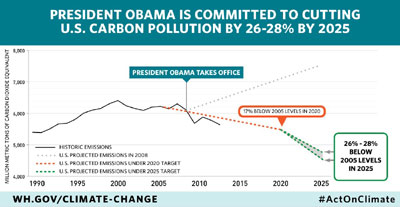Update: As of December 1, 157 companies have signed on.
—
13 of America’s largest companies signed onto President Obama’s latest effort on climate change, the American Business Act on Climate pledge.
They pledged to support a strong agreement at the Paris Climate Summit in December and confirmed their own efforts to reduce their carbon footprints – totaling $140 billion in new investments and bringing 1.6 gigawatts of renewable energy online.
The companies are: Alcoa, Apple, Bank of America, Berkshire Hathaway Energy, Cargill, Coca-Cola, General Motors, Goldman Sachs, Google, Microsoft, PepsiCo, UPS, and Walmart. This fall, a second round of pledges will be announced.

The American Business Act on Climate pledge says:
We applaud the growing number of countries that have already set ambitious targets for climate action. In this context, we support the conclusion of a climate change agreement in Paris that takes a strong step forward toward a low-carbon, sustainable future.
We recognize that delaying action on climate change will be costly in economic and human terms, while accelerating the transition to a low-carbon economy will produce multiple benefits with regard to sustainable economic growth, public health, resilience to natural disasters, and the health of the global environment.
We put forth our pledges as follows:
Alcoa: reduce greenhouse gas (GHG) emissions 50% by 2025 in the US from 2005 levels; develop materials and products that move us toward a low carbon future.
Apple: bring another 280 megawatts of renewable energy online by the end of 2016 in the US and China. Apple has cut carbon emissions 48% globally since 2011 and US operations run on 100% renewables.
Bank of America: increase environmental financing to $125 billion by 2025 (lending, investing, capital raising, advisory services) worldwide. Attract more diverse capital sources for renewable energy by developing innovative financing structures such as green bonds and its Catalytic Finance Initiative which reduces investment risk. BAM has provided over $39 billion in financing for low-carbon activities since 2007.
Berkshire Hathaway Energy: by the end of 2017, MidAmerican Energy will double investments in renewable energy to $30 billion, bringing its portfolio to over 4 GW of wind – 57% of its retail energy load. During that time, Pacificorp will buy over 1 GW of solar and wind, bringing its portfolio to over 4.5 GW – about 22% of its retail generating load. Invest in transmission infrastructure; Retire over 75% of coal-fired power plants in Nevada by 2019.
Cargill: by 2020, it will cut another 5% from GHG intensity, water and energy use (having already cut energy use 16%, carbon intensity 9% and water use 12%). It pledges to increase renewable energy to 18% of all energy use, up from 14% now.
More important than these fairly weak goals, are this agribusiness’s work to protect forests. It signed the UN’s New York Declaration on Forests – which has a goal of cutting forest loss in half by 2020, and ending it by 2030.
On palm oil, Cargill says it’s building a traceable supply chain "firmly committed to zero deforestation of high conservation value lands or high carbon stock areas; no development on peat, and no exploitation of rights of indigenous peoples and local communities. It participates in the Brazil Soy Moratorium which has been working to stop deforestation in the Amazon, and is a founding member of the Global Roundtable for Sustainable Beef and US Roundtable for Sustainable Beef.
Coca-Cola pledges to reduce the carbon footprint of "the drink in your hand" 25% by 2020. "We intend to make significant, comprehensive changes, investments and technology advancements" in low carbon ingredient sourcing, manufacturing, packaging and delivery across the supply chain.
General Motors: reduce energy intensity 20%, water use by 15%, and waste by 40% by 2020 from a 2010 baseline, while "promoting use" of 125 MW of renewable energy and helping electric vehicles become more mainstream.
Goldman Sachs pledges to reach carbon neutrality this year from operations and business travel, and use 100% renewable power for global electricity needs by 2020. Since 2012, it has mobilized $33 billion in capital for clean technologies, they say, and will reach $40 billion next year.
Google will continue on the path toward 100% renewable energy, tripling the 1.1 GW of current investments by 2025. It will reduce the use of single-occupancy vehicles at its headquarters another 10% by providing shuttles and another water use another 30% this year.
Microsoft will maintain carbon neutral operations by purchasing 100% renewable energy and offsetting all emissions from business air travel by supporting important projects in developing countries.
PepsiCo will expand sustainable farming practices to 500,000 acres used by North American suppliers of corn, potatoes and citrus by the end of next year, under its Sustainable Farming Initiative. All point-of-sale equipment (coolers, vending machines and fountain dispensers) in the US will be HFC-free by 2020. Drive down emissions from its global fleet and strive for zero deforestation in the global supply chain by 2020. Increase recycled content in packaging.
UPS: cut emissions 20% by 2020 from 2007 levels and achieve a billion miles of deliveries using clean fuels this year.
Walmart will double the number of on-site solar systems at US stores, Sam’s Clubs and distribution centers by 2020, from 2013 levels, and buy or drive 600% more worldwide. It will cut energy intensity 20% by 2020 in buildings around the world, while working with suppliers to reduce emissions from agriculture on 23 million acres in the US and Canada. As part of the Consumer Goods Forum, it will achieve zero net deforestation in product sourcing by 2020.
26% of Walmart’s electricity comes from renewable energy – the goal is 100%. It uses 9% less energy per square foot since 2010.

